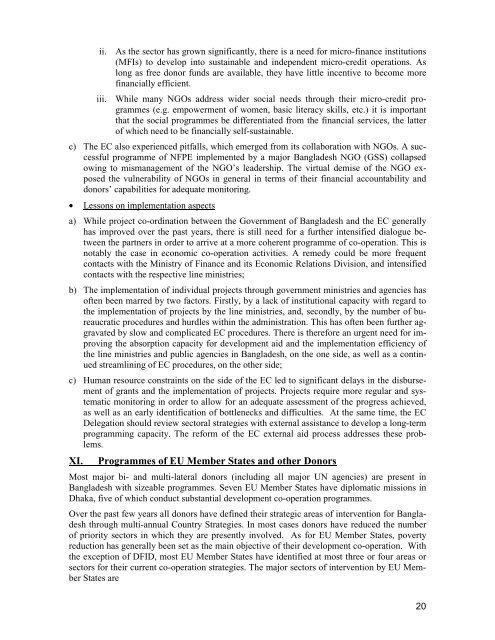EC Country Strategy Paper for Bangladesh 2002-2006
EC Country Strategy Paper for Bangladesh 2002-2006
EC Country Strategy Paper for Bangladesh 2002-2006
Create successful ePaper yourself
Turn your PDF publications into a flip-book with our unique Google optimized e-Paper software.
ii. As the sector has grown significantly, there is a need <strong>for</strong> micro-finance institutions<br />
(MFIs) to develop into sustainable and independent micro-credit operations. As<br />
long as free donor funds are available, they have little incentive to become more<br />
financially efficient.<br />
iii. While many NGOs address wider social needs through their micro-credit programmes<br />
(e.g. empowerment of women, basic literacy skills, etc.) it is important<br />
that the social programmes be differentiated from the financial services, the latter<br />
of which need to be financially self-sustainable.<br />
c) The <strong>EC</strong> also experienced pitfalls, which emerged from its collaboration with NGOs. A successful<br />
programme of NFPE implemented by a major <strong>Bangladesh</strong> NGO (GSS) collapsed<br />
owing to mismanagement of the NGO’s leadership. The virtual demise of the NGO exposed<br />
the vulnerability of NGOs in general in terms of their financial accountability and<br />
donors’ capabilities <strong>for</strong> adequate monitoring.<br />
• Lessons on implementation aspects<br />
a) While project co-ordination between the Government of <strong>Bangladesh</strong> and the <strong>EC</strong> generally<br />
has improved over the past years, there is still need <strong>for</strong> a further intensified dialogue between<br />
the partners in order to arrive at a more coherent programme of co-operation. This is<br />
notably the case in economic co-operation activities. A remedy could be more frequent<br />
contacts with the Ministry of Finance and its Economic Relations Division, and intensified<br />
contacts with the respective line ministries;<br />
b) The implementation of individual projects through government ministries and agencies has<br />
often been marred by two factors. Firstly, by a lack of institutional capacity with regard to<br />
the implementation of projects by the line ministries, and, secondly, by the number of bureaucratic<br />
procedures and hurdles within the administration. This has often been further aggravated<br />
by slow and complicated <strong>EC</strong> procedures. There is there<strong>for</strong>e an urgent need <strong>for</strong> improving<br />
the absorption capacity <strong>for</strong> development aid and the implementation efficiency of<br />
the line ministries and public agencies in <strong>Bangladesh</strong>, on the one side, as well as a continued<br />
streamlining of <strong>EC</strong> procedures, on the other side;<br />
c) Human resource constraints on the side of the <strong>EC</strong> led to significant delays in the disbursement<br />
of grants and the implementation of projects. Projects require more regular and systematic<br />
monitoring in order to allow <strong>for</strong> an adequate assessment of the progress achieved,<br />
as well as an early identification of bottlenecks and difficulties. At the same time, the <strong>EC</strong><br />
Delegation should review sectoral strategies with external assistance to develop a long-term<br />
programming capacity. The re<strong>for</strong>m of the <strong>EC</strong> external aid process addresses these problems.<br />
XI. Programmes of EU Member States and other Donors<br />
Most major bi- and multi-lateral donors (including all major UN agencies) are present in<br />
<strong>Bangladesh</strong> with sizeable programmes. Seven EU Member States have diplomatic missions in<br />
Dhaka, five of which conduct substantial development co-operation programmes.<br />
Over the past few years all donors have defined their strategic areas of intervention <strong>for</strong> <strong>Bangladesh</strong><br />
through multi-annual <strong>Country</strong> Strategies. In most cases donors have reduced the number<br />
of priority sectors in which they are presently involved. As <strong>for</strong> EU Member States, poverty<br />
reduction has generally been set as the main objective of their development co-operation. With<br />
the exception of DFID, most EU Member States have identified at most three or four areas or<br />
sectors <strong>for</strong> their current co-operation strategies. The major sectors of intervention by EU Member<br />
States are<br />
20

















